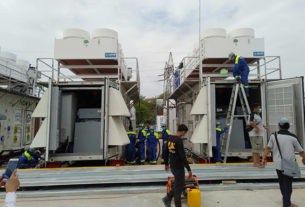Influential Thais push to build $28bn Kra canal
A lobby group of Thai generals, politicians, academics and business people have joined with Chinese interests to persuade Bangkok to revive the plan to build a $28bn, 140-km canal across Thailand’s Kra isthmus, allowing ships to avoid the congested Straits of Malacca.
According to the Nikkei Asian Review, the group includes some of the country’s “most influential figures”.
Thailand is presently led by military junta headed by General Prayuth Chan-ocha, whose regime ruled out building the canal in the immediate future owing to its projected cost and the symbolic effect of dividing the country.
However, the lobby group is arguing that if a feasibility study were to be approved, the canal could be funded by Chinese banks as part of China’s grand One Belt, One Road vision.
The campaign to dig the channel is being spearheaded by a group of retired generals who have formed the Thai Canal Association. The group is working with researchers from Peking University and the Thai–Chinese Trade Association to survey the proposed route and drum up popular support for its implementation.
The group has set up public meetings to promote the project in Thai provinces it could run through, including Trang, Nakhon Si Thammarat, Phatthalung, and Songkhla.
One meeting in May was told that the project would consist of two canals, each 140km long, 400m wide and 30m deep. Development projects would also be undertaken on both sides and deepwater ports would be built at either end. The budget was estimated at around 1.68 trillion baht, or $50.5bn, and the projected income for Thailand would be around $3.6bn a year.
Nicholas Farrelly, a regional expert at the Australian National University, told the Nikkei Asian Review that he did not rule out the possibility of the retired generals winning their campaign, especially as the junta needed to boost the Thai economy and stabilise the country’s precarious political situation.
“These old warhorses are indicating to their protegés that this is something that needs putting on the agenda,” Farrelly said. “Although they are somewhat estranged from direct executive authority, they are serious players. At some stage, I think it is likely to happen.”
The goal of the Kra canal would be to bypass the Straits of Malacca, which lie between the island of Sumatra and the Malay peninsula. These are 890km in length, 2.5km wide at their narrowest point and 25m deep at their shallowest. More than 94,000 vessels pass through the straits each year, making them the busiest in world. Altogether it is estimated that about a quarter of the world’s traded goods pass through, including 80% of the oil and gas imports of China, Japan and South Korea.
The benefit to China from the Kra canal would be to shave up to three days off ships’ journeys between the Pacific and Indian oceans. It would also reduce the strategic dependence of the Chinese economy on its Indonesian sea routes, which is also a main motivation behind the drive for new overland corridors to the west encapsulated in Beijing’s One Belt, One Road strategy.
The Sydney Morning Herald notes that the canal has long figured in Chinese long-term plans. In 2005, a report for then US Defence Secretary Donald Rumsfeld leaked to The Washington Post said China was prepared to underwrite a project lasting 10 years and employing 30,000 workers.
In May 2015, news emerged that China and Thailand had signed a memorandum of understanding to advance the Kra canal project, and had set up the China–Thailand Kra Infrastructure Investment and Development Company – which is where the cost estimate of $28bn came from. However, it was reported that both Chinese and Thai governments had denied there was any official agreement to build the canal.
China’s reluctance to speak openly about the Kra project was attributed at the time to its awareness of the diplomatic sensitivity of the scheme. Zhao Hong, an expert on China foreign relations from the Institute of Southeast Asian Studies, said: “China will have to consider the feedback from countries such as Singapore, which it has friendly ties with, given the impact that the Kra canal might have.”
Singapore is situated on the Malacca straits and might be expected to lose some of its “zero deviation” traffic (that is, ships that do not have to alter course to call in). In a speech earlier this year, Josephine Tao, Singapore’s senior minister of state, said it was too early to determine the impact of port developments and the Kra canal on Singapore.
She said: “Whatever the analysis, the only response that will serve our long-term interests is to keep improving to stay ahead. Therefore it is not enough to build bigger ports. We need smarter ports.”
Source: http://www.globalconstructionreview.com/news/influential-thais-push-build-28bn-kra-canal/


